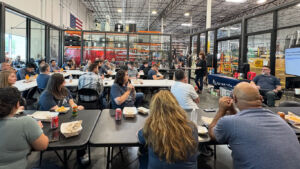Skanska hires assistant superintendent in Phoenix office
Skanska, one of the world’s leading construction and development firms, recently announced that Sam Anderson has been hired as an assistant superintendent for its Phoenix office.
In his new role, he will be responsible for on-site superintendent duties for Banner Estrella and Banner Del Webb hospital projects, assisting with estimating and preconstruction of new Banner pursuits and awards across Arizona, as well as supporting the superintendent for other Banner facility projects.
Previously, Anderson was an assistant superintendent at Pepper Construction in Indianapolis, Ind. He is also a first lieutenant in the Army National Guard in his 10th year of service, working as an executive officer for the 819th Engineer (SAPPER) Company.
Skanska, which has been active in the building construction market in Phoenix for many years, is based at 2800 N. Central Avenue in Phoenix. Current local projects include; Banner Health System, Arizona Projects and Parallel Capital Partners, Arizona Center Retail Refresh.
Amendola Communications appoints senior account director
Amendola Communications, a nationally recognized, award-winning healthcare and technology public relations and marketing agency, today announced that Megan Smith has joined the agency as senior account director.
|
Smith joins Amendola with more than a decade of public relations, marketing and account management experience in healthcare, technology and ecommerce. During her career, Smith has held increasingly responsible positions with Edelman and Dodge Communications, where she helped companies build and execute strategic communications and marketing programs, leveraging traditional PR, marketing communications and digital strategies to evolve, promote and protect her clients’ brands. Most recently, Smith served as the Director of Client Services and ecommerce for EYStudios, a specialty ecommerce web design and development firm. In this role, she helped build relationships with more than 25 clients and provided counsel on how to grow their business through increasing traffic and improving conversions as well as content marketing. |
NorthMarq Multifamily expands manufactured housing team
NorthMarq Multifamily announced today that Chris Michl has joined its national manufactured housing team, which is based in Phoenix, Arizona.
In his new role at NorthMarq, Michl will use his business expertise to market manufactured housing communities and identify buyers and sellers of the asset class. He will also work to expand the team’s presence outside of its primary focus in the southwest.
Michl arrives at NorthMarq after five year in staffing/recruiting companies, where he facilitated staffing needs by identifying and recruiting talent. His experience includes developing strategic partnerships, assessing business requirements and analyzing client satisfaction.
“Chris is a great addition to our manufactured housing team,” said Trevor Koskovich, president – NorthMarq Multifamily. “With his diverse sales experience, he brings a great new perspective to our clients and our business.”
3 from UA recognized by AAAS in new class of Fellows
|
Three University of Arizona faculty members have been elected 2018 fellows of the American Association for the Advancement of Science, or AAAS, the world’s largest general scientific society. Election as an AAAS fellow is an honor bestowed on AAAS members by their peers. An induction ceremony will take place Feb. 16 during the 2019 AAAS Annual Meeting in Washington, D.C. The three fellows from the UA for 2018 are: Karl W. Flessa, professor of geosciences, for geology and geography; Michael A. Riehle, professor of entomology, for biological sciences; and Xubin Zeng, professor of hydrology and atmospheric sciences, for atmospheric and hydrospheric sciences. Karl Flessa, a professor of geosciences with a joint appointment in ecology & evolutionary biology, was honored for distinguished contributions to paleobiology, especially for demonstrating the power of the fossil record to address critical issues in conservation biology and environmental change. A paleobiologist by training, Flessa has studied macroevolution and extinction in the fossil record and biogeography. His recent research is in paleoecology and conservation paleobiology – the use of fossils to assess environmental impact and help preserve and restore habitats, species and ecosystem services. He calls it “putting the dead to work.” His current focus on the Colorado River Delta stems from a 1992 field trip to the upper Gulf of California. The researchers saw beaches composed of nothing but shells of one species of clam, but they could find only a few live clams of that species. The team’s research revealed the species had declined as a result of upstream diversions of Colorado River water since 1960. Now, Flessa is the chief scientist of a binational, multidisciplinary team charged with evaluating the hydrological, ecological and social effects of transboundary environmental flows of water to the Colorado River Delta, an effort conducted under the auspices of the International Boundary and Water Commission. For some of their work on the Colorado River Delta, he and colleagues received a “Partners in Conservation Award” in 2013 from the U.S. Department of the Interior. Flessa’s other projects focus on increasing access to graduate degrees in science, technology, engineering and math for underrepresented minority students, and providing community-based internships for transfer students in geosciences. He served as head of the UA Department of Geosciences and also the UA Department of Ecology and Evolutionary Biology and was a Fellow at the UA Udall Center for Studies in Public Policy. A past president of the Paleontological Society, Flessa has also been a program director at the National Science Foundation. As part of the Section of Biological Sciences, Michael A. Riehle, a professor in the Department of Entomology in the UA College of Agriculture and Life Sciences was elected as an AAAS Fellow for distinguished contributions to the field of insect biology, particularly pioneering advances in understanding the insulin pathway in mosquitoes and its effects on pathogen transmission. In Riehle’s team, undergraduate and graduate students work with collaborators in other UA departments, UA Cooperative Extension and the University of Idaho on a future without malaria. Of the estimated 250 million people who contract malaria each year, 1 million – mostly children – do not survive. Each new malaria case starts with a bite from a vector – a mosquito belonging to the genus Anopheles. If successful, Riehle’s research could someday lead to lab-bred, harmless mosquitoes that would be released into the wild to replace their free-living counterparts. To that end, Riehle and his team rear mosquitoes in a secure lab and use genetic and molecular technologies to modify their physiology. The group has homed in on a protein that acts as a chemical signal, regulating important physiological processes like the mosquitoes’ life span, immunity, reproduction, development and growth. It takes about 14 days for the single-celled parasite that causes malaria to establish itself inside the mosquito, and once the parasite is in the insect’s salivary glands, that mosquito will be infectious for the rest of its life, says Riehle, whose goal is “to generate mosquitoes that can’t harbor the parasite or transit it back to people, but at the same time can compete effectively with its counterparts in the wild.” Xubin Zeng holds the Agnese N. Haury Chair in Environment and is a UA professor of hydrology and atmospheric sciences. He is also director of the UA Climate Dynamics and Hydrometeorology Center and co-chair of the UA Strategic Planning and Budget Advisory Committee. Zeng was honored for distinguished contributions to the understanding, data development and modeling of atmosphere-land-ocean interface processes. Zeng enjoys doing research that improves weather and climate forecasts because it combines working on challenging scientific questions with making improvements that help people in their daily lives. He also wants others to be successful in the field. To that end, he teaches undergraduate and graduate students and helps them and his junior colleagues succeed. Zeng’s research helps answer fundamental questions about atmospheric physics while also solving practical problems. He uses computer models to figure out how weather and climate are affected by the interactions among the land, the atmosphere and the ocean. The models developed by his research group combine data from several different types of measurements and are widely used to help forecast future climate and weather. Zeng’s work acts as a bridge between scientists who take ground-based and satellite-based weather and climate measurements and scientists who focus on computer models. His service to the larger scientific community includes co-chairing the Global Atmospheric System Studies Panel of International Global Energy and Water Cycle Exchanges project, and providing scientific advice to four different U.S. federal agencies: the National Oceanic Atmospheric Administration, the Department of Energy, the National Science Foundation and NASA. In addition, Zeng is the deputy principal investigator of a newly funded $30 million, five-year NASA project on aerosol-cloud-meteorology interactions. He is a Fellow of the American Meteorological Society, an Arizona Leadership Institute Fellow and a Galileo Circle Fellow. |



